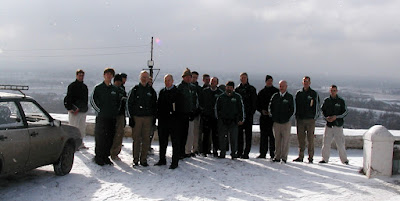I am sure I didn't appreciate at the time just how jarring it would be to experience, however slightly, such a rapidly changing set of scenes and circumstances. In less than 24 hours we had left the relative familiarity of western Europe for a world that was simply "other," unfamiliar. And we were in constant motion, so there was almost no time to "take it in" -- whatever that might have entailed.
Everything about our quick "tourist visit" to the Orthodox service on Palm Sunday brought this otherness into sharp, though confusing, focus. The Assumption Cathedral itself commands the highest point in Vladimir. It stands atop a bluff, where the view of the river and the vast plain below is extensive. The city of Vladimir extends across the plateau atop the bluff where the Cathedral stands sentinel.
Next to the Cathedral was a monastery. After the 1917 Bolshevik Revolution the Church would have been preserved as a "museum," and the monastery was converted into a military barracks. No doubt many churches were destroyed under Soviet rule, but many also were secularized as museums due to their artistic, architectural, and cultural significance.
In this way and for this reason, many Orthodox churches were able to reopen after the Soviet Union broke apart. This, without modernizing -- a piece of the ancient past reappearing almost overnight. We in the west might have expected Orthodoxy to have been wiped out during the decades of Soviet rule, but it was not.
Nevertheless, it is into this presumed religious vacuum following the disintegration of the USSR that many religious groups, including our own, arrived. I do not wish to suggest that Global Partners should not have gone in -- far from it. What I am suggesting is that the situation (political, cultural, social, historical, and religious) is harder to assess and respond to from afar than we in the west might imagine.
.
Beyond the former monastery is a much smaller chapel built by one of the Czars for private services. Though on a much grander scale, it reminded me of the small churches (or chapels) built by the upper classes in England for private services. Religious services for the locals, for the masses, were all well and good -- even necessary -- just so long as the aristocracy did not have to mix.
Our quick walk-through of the Assumption Cathedral left me with many questions about all sorts of things, not least of which was how one ought to reconcile the role of tourism with ministry.
Nevertheless, once we had gathered outside the Cathedral, our group split up. Two ministry teams from our main group, one headed by Mason Sorensen and one headed by John Horton, both pastors, headed out in vans.
The rest of us walked back to the main road to take a trolly-bus to the Wesleyan Mission Center for a Palm Sunday worship service. We were glad to get back on the trolly-bus, out of the weather: The wind was cold, cold, cold. Many of us had not dressed sufficiently just as the man at the airport had predicted. I was grateful for my wool stocking cap.
Although it was conducted entirely in Russian, the service was a delight -- mostly young people and middle-aged adults.
During the few moments given to "greet your neighbor" I greeted a teenage girl standing nearby who was embarrassed and quickly turned away. I had more success with kids -- the 5th grade daughter of a young Canadian missionary couple, and two unattached boys (street kids, someone suggested) who looked up questions in a phrase book to ask me: When did you come? How long are you staying? How old are you? It was a good exchange, I think; I had found my comfort level.Our missionary contact, Pastor Blake, brought a message from John 18 -- in English with a translator converting his words into Russian. Although John 18 makes a lot of sense for Palm Sunday and the run-up to Easter, I remember nothing about the sermon. No notes beyond the Bible reference and no visual memories apart from Pastor Blake smiling as he spoke into the microphone.
From the Ministry Center we piled into a van for a short ride to a restaurant, where I dutifully noted "chicken, with ice cream for desert." Back to the hotel at 3:30. Pick up at 4 by the Canadian missionary and his 5th grade daughter, whom I had met in the service, to go to their house for "tea" -- pigs-in-a-blanket, shredded carrots in vinegar, peas, and potato salad.
There is a lesson of some sort here: my notes on food are extensive but the sermon is entirely overlooked.
At tea we met three Christian students, Russian, who belonged to yet another gathering place -- a house church where we would be heading next. We tried to express friendliness despite the language barrier. But whether it was jet-lag, language barriers, the culture shifts and expectations, or the quick changes in location I was struggling. Some in our group were much better at these interactions than I proved to be.
I can't remember a longer Palm Sunday before or since. After tea concluded, we got on yet another trolly-bus and rode to the end of the line. The tracks ended at a concrete barrier -- that kind of "end of the line." It was starting to get dark as we hiked across muddy lots and down muddy streets on our way to the house church, a first journey, I see now, deeper into the heart of Russia.















